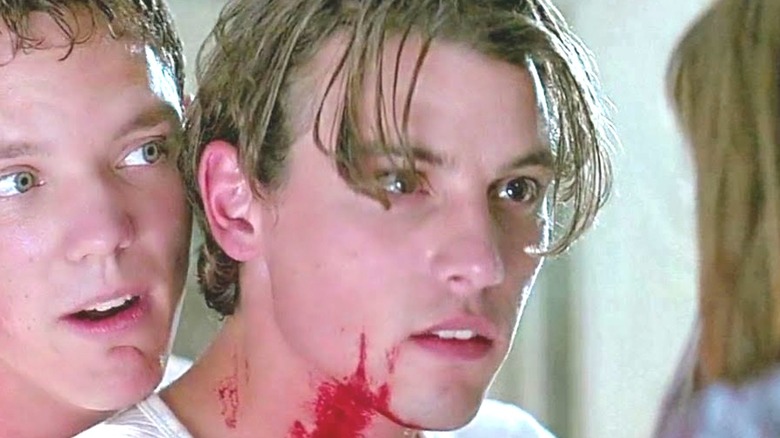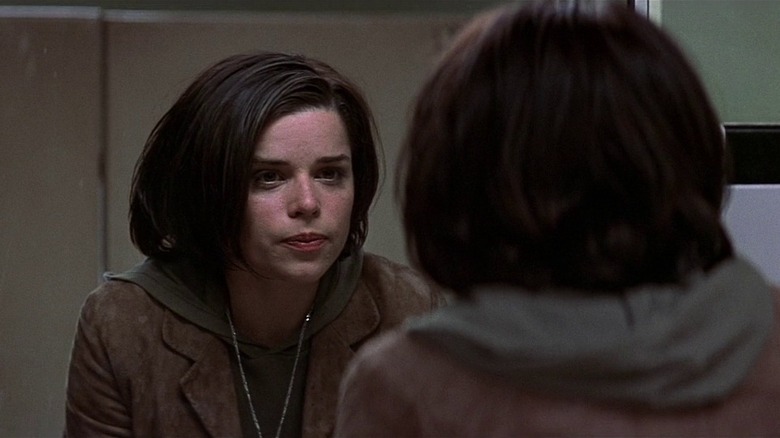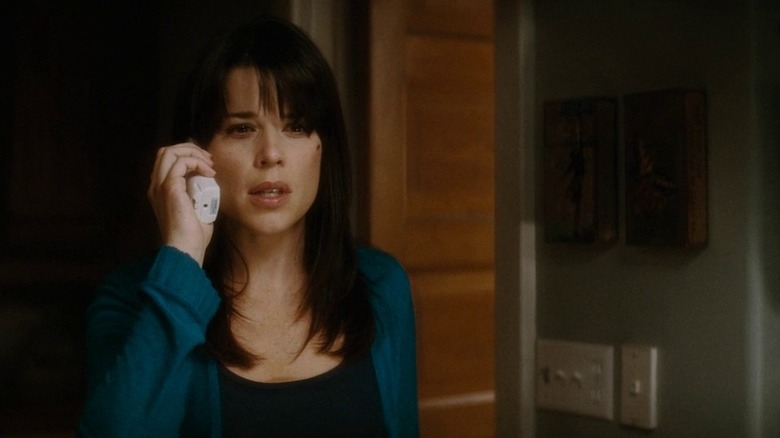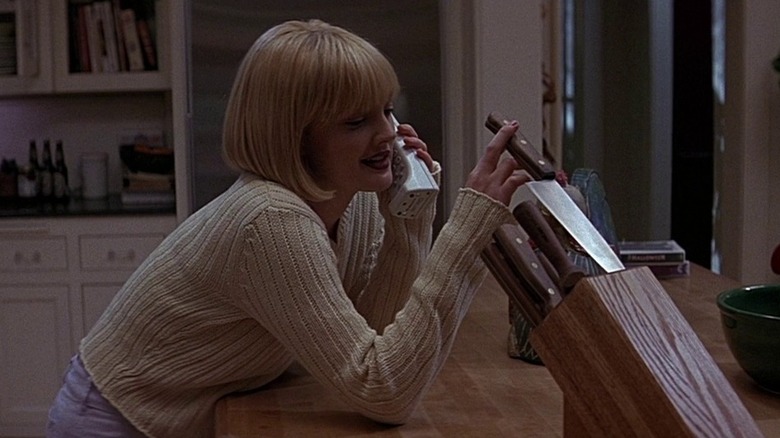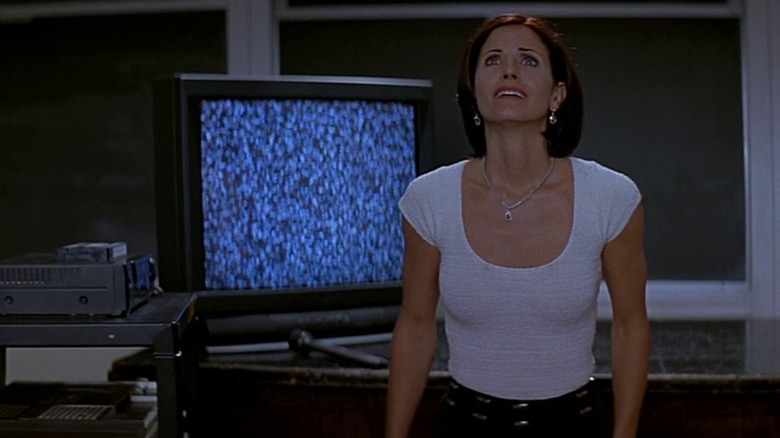Every Scream Movie Ranked Worst To Best
In 1996, the first "Scream" film was released into theaters and promptly revitalized the horror genre. Not only did the film give audiences one of the best opening sequences in movie history, it expertly blended horror and comedy thanks to a sharply self-aware script from Kevin Williamson, which cemented it as one of the best films of the genre. Much of the franchise's success can also be attributed to its director, horror master Wes Craven, who helmed the first four "Scream" films.
The first "Scream" follows Sidney Prescott (Neve Campbell), who is already grappling with the death of her mother when her town, the fictional Woodsboro, California, begins facing a string of murders by a killer who becomes known only as "Ghostface" because of the mask they wear. In the subsequent "Scream" sequels, which came out in 1997, 2000, and 2011, respectively, several different killers take on the Ghostface persona in order to continue terrorizing Sidney and her friends.
Now, the franchise's fifth film, simply titled "Scream," is slated to premiere next year. It will be the first of the franchise not to be directed by Craven, who died in 2015. Matt Bettinelli-Olpin and Tyler Gillett — the filmmaking duo behind the 2019 satirical horror film "Ready or Not" — have taken over as the directors of the movie, with a script written by James Vanderbilt ("The Amazing Spider-Man") and Guy Busick ("Ready or Not").
With a new "Scream" movie on the way, now is as good a time as any to look back on the franchise's four existing films and rank them worst to best — based on their Rotten Tomatoes scores. Read on to find out the best "Scream" film.
4. Scream 3
"Scream 3," which came out in 2000, was not nearly as well-received as its two predecessors. With just a 40% Tomatometer score — and an ever lower 37% audience score — "Scream 3" is considered the worst of the franchise's four existing films. The film takes viewers back to Woodsboro, as a new murderer emerges and begins targeting all of the franchise's original survivors. Neve Campbell returns as Sidney Prescott, as do Courteney Cox and David Arquette as Gale Weathers and Dewey Riley, respectively. While it is directed by Wes Craven, it's also the first film of the franchise not penned by Kevin Williamson.
Summing up what many critics disliked about this installment, Keith Phipps of The AV Club wrote in his review of the film that, "Virtually none of the craftsmanship of Craven's best is on display here, and what good ideas do turn up are largely recycled from previous efforts." Adding to this sentiment, Ted Anthony of the Associated Press wrote, "Ultimately, this is the question: How often can you send up the same thing? By a series' third film, you should actually care about characters. It's hard, though, when the odds are that everyone's either a killer or a goner."
However, not all of the film's reviews were negative. Joe Leydon of Variety called it "a crafty and well-crafted wrap-up that really does bring a satisfying sense of closure to the franchise." Of course, "Scream 3" ended up not being the final installment in the franchise, despite being marketed that way at the time.
3. Scream 4
Over a decade after the release of its third film, horror's best self-referential franchise returned with "Scream 4." Kevin Williamson, the screenwriter of the first and second "Scream" films, returned to pen the fourth installment's script, while Wes Craven came back to direct the project.
In "Scream 4," Sidney (Neve Campbell) has written a self-help book to help overcome the trauma we saw her go through in the first three films. When she returns to Woodsboro to promote her book, Ghostface also returns, and Sidney and her old friends, Gale Weathers (Courteney Cox) and Dewey Riley (David Arquette), all find themselves facing their worst nightmares once again.
With a 60% Tomatometer score, the reviews for "Scream 4" were more mixed than they'd been for its three predecessors. On the negative side of the spectrum, Marc Savlov of the Austin Chronicle argued, "There is such a thing as too much meta and, contrary to popular belief, irony is not always good for the bloodshed." In agreement, James Berardinelli of ReelViews wrote, "'Scream's brand of horror, which lampooned the slasher genre while simultaneously embracing it, was fun and breezy in 1996. In 2011, it's about as fresh as the whiff of something stale and rank from a crypt."
However, there were still plenty of critics who liked the sequel. Sara Michelle Fetters of MovieFreak.com wrote (via Rotten Tomatoes), "[They've] taken the ideas of the first film and twisted them in on themselves, using the technological advances of the last decade and society's celebrity-obsessed culture to give the series an invigorating kick."
2. Scream
As the one that started it all, 1996's "Scream" is naturally near the top of this list. With its clever sense of self-awareness (there are countless blatant references made to horror tropes throughout the film) and delightfully subversive streak, "Scream" impressively managed to parody the genre while still scaring audiences.
In an in-depth reading of the film, Stephanie Archer of Film Inquiry wrote, "'Scream' demands your attention from its first few moments, a woman's scream filling as the words 'Scream' appear, the sound of a phone ringing transitioning to the film's opening ... As the phone continues to ring, the tension increases, the hairs on your arm standing on end as the malicious game is unveiled, and the presumed safety of Casey's home is peeled away piece by piece."
Loved by both critics and audiences alike, "Scream" has a 79% Tomatometer score and a matching audience score on Rotten Tomatoes. In a 1996 review, Dave Kehr of the New York Daily News wrote, "[Wes] Craven and [Kevin] Williamson turn 'Scream' into a self-reflexive romp ... [which] builds to a splattering finale that should leave genre fans highly satisfied."
Fortunately, "Scream" has remained both beloved and highly acclaimed in the decades since its initial release. For instance, in a 2018 article on The Ringer, which deems "Scream" the best horror movie of its year, writer Sean Fennessey argues, "Not every movie can do what 'Scream' did—verbalize tropes, subverting them while paying homage—but after this one did, with wit and sincere horror, it revolutionized an audience. No one really tries to emulate what 'Scream' did. But virtually everyone knows that once it happened, we could never go back."
1. Scream 2
Many fans may have assumed that the original "Scream" would be at the top of this list — after all, it's frequently credited with revitalizing the entire horror genre. But with an 81% Tomatometer score, it's actually "Scream 2" that comes out on top, and likely because of how it manages to continue the success of the first film in a captivating and fresh way. That's especially clear in the way that the sequel introduces its movie-within-a-movie, titled "Stab," which is based on the horrific murders that took place in the first "Scream." Of course, with the premiere of "Stab" comes a new killer, who takes on the Ghostface persona and begins to terrorize Sidney (Campbell) all over again.
Andrew O'Hehir of Salon.com wrote (via Rotten Tomatoes) that, "'Scream 2' is an ingenious, often hilarious, movie that does nothing to diminish the well-deserved cult reputation of its director." Meanwhile, Trace Thurman, host of the Horror Queers Podcast, gave it the ultimate compliment by calling it "a perfect horror sequel."
Now, we can't wait to see where 2022's "Scream" lands on this list when it premieres in January.
